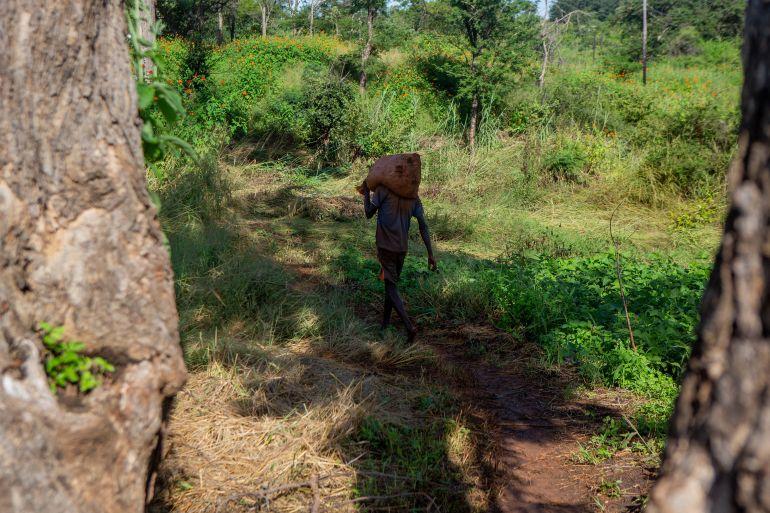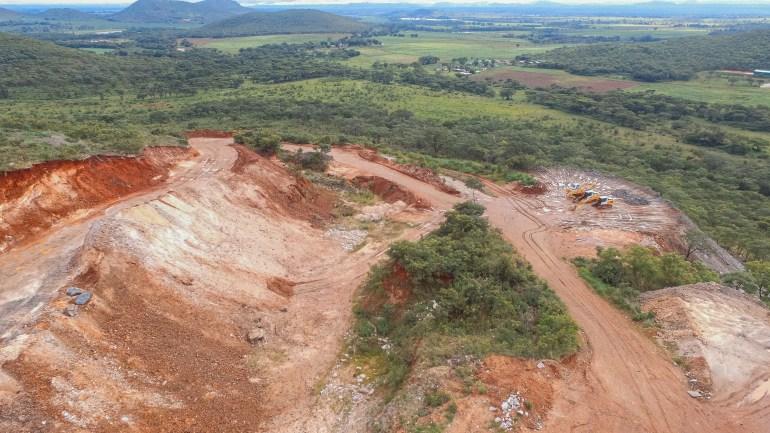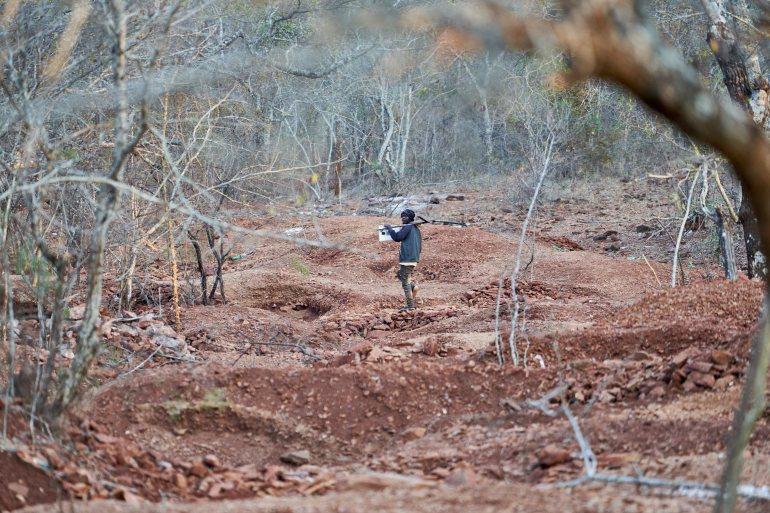Source: ALJAZEERA
ALJAZEERA MEDIA NETWORK

Small-scale miners in Zimbabwe find challenges in adapting to reduced demand and lowered prices for lithium ore.
Shamva, Zimbabwe – On a cool winter morning in Shamva, within Zimbabwe's Mashonaland Central province, Brenda, a single mother of three, searches for lithium ore.
The 39-year-old, who requested to be referred to only by her first name, uses a pick to break apart rocks, then loads the pieces into a wheelbarrow pushed by one of her workers, who then dumps them onto a pile.
“Mining is tough work, but I push through,” said the tall, broad-shouldered woman dressed in a blue uniform with green reflectors and a yellow safety helmet.
All around her, many artisanal miners tirelessly extract ore from the lithium-rich surface mining site, about 90km (56 miles) northeast of Harare.
“I don’t let anything stop me. I face each situation head-on,” Brenda told Al Jazeera. “Back in school, I was the only girl in my chemistry class. I learned to be brave, resilient, and independent.”
Zimbabwe boasts the world’s fifth-largest reserves of lithium, an essential component for rechargeable batteries used in phones and electric vehicles.
In 2021, Zimbabwe produced 1,200 tonnes of lithium, becoming the country’s third-largest mineral export after gold and platinum group metals.
Several companies are engaged in lithium mining and exploration in Zimbabwe. However, small-scale miners are also taking an interest in the industry.
Driven by high unemployment and persistent economic challenges, many like Brenda obtain permits and licenses from Zimbabwean authorities to mine the mineral in lithium-rich regions.

 Aerial view of Arcadia lithium mine in Zimbabwe.
Aerial view of Arcadia lithium mine in Zimbabwe.
Southern Africa has abundant natural resources, though only a small elite has benefited. To boost local economies, regional governments are increasingly seeking to process raw minerals locally.
Zimbabwe's government introduced a ban on the export of unprocessed raw lithium in 2022, arguing the country would reap more revenue if only processed lithium was exported.
The ban aimed to reduce raw lithium smuggling through porous borders with South Africa and Mozambique.
However, the ban has negatively impacted many small-scale miners.
When the ban was implemented, the demand for processed lithium destined for export surged while the demand for raw lithium dropped as few had the capability to process it. Mining companies rushed to build plants to convert raw lithium into exportable concentrates, leading to stockpiles of raw lithium and lower prices.
Artisanal miners like Brenda, at the lower end of the lithium value chain, suffered the most. She stated that since the ban, her profits have dwindled as unprocessed lithium prices dropped from $1,200 per tonne to the current $100 per tonne.
“Many people have exited the business,” said Brenda, who relies on her mining income for her family's sustenance, school fees, and other essentials.
“Only a few of us who persevered remain in the lithium mining sector. Those chasing profits couldn’t survive at such low prices,” she said.

 Artisanal miner at a trench in Zimbabwe.
Artisanal miner at a trench in Zimbabwe.
Brenda began in the mining industry by buying and selling semi-precious stones before venturing into lithium mining in 2014.
The busy lithium surface area where Brenda works buzzes with noise from other artisanal miners drilling and blasting rocks.
Brenda, who discovered lithium deposits in a bushy area, pegged and registered the site with mining authorities. She pays royalties to the government for a mining permit.
Learning mining techniques from books and research, she employs 10 workers – two machine operators and eight general workers – to help her mine lithium.
Brenda lacks resources to process lithium, so she sells it to Chinese buyers in Zimbabwe, who then process it for export.
“The Chinese are here to stay. We depend on them. They set the prices. We have limited choices,” she said.
Economist Victor Bhoroma stated that most lithium ore buyers have access to secondary producers and international buyers.
“They are part of an extensive value chain where local artisanal miners receive less than 3 percent of the output value per tonne.”

Bhoroma mentioned that “exporting processed lithium instead of raw stone is ideal", but noted that the ban affected pricing and supply, as the raw commodity couldn't be exported or sold easily.
Since December 2022, global lithium prices have dropped due to factors like oversupply of the battery metal.
With the global shift to clean energy to combat climate change, lithium is crucial for making batteries used in electric vehicles.
While lithium mining in Zimbabwe dates back to Bikita Minerals in the 1950s, the recent demand surge has been notable.
China, a major consumer of lithium due to its dominance in lithium-ion battery manufacturing, leads the demand in Zimbabwe.
“China is the primary player in lithium demand and battery production,” Bhoroma added.
China has capitalized on good relations with Zimbabwe’s President Emmerson Mnangagwa’s government.
Sanctioned by the U.S. over alleged human rights violations and corruption, Mnangagwa and top officials have fostered relations with China, which claims a noninterference policy.
This relationship enabled China to secure mining licenses across Africa. Notably, China's Sinomine Resource Group acquired Zimbabwe’s largest lithium mine, Bikita Minerals, for $180m to boost capacity in February 2022.
Bikita Minerals, in Masvingo province, holds 11 million tonnes of lithium, the world's largest known deposit.
Tapiwa O’Brien Nhachi, an independent climate and natural resources researcher, said China's aggressive entry into Zimbabwe’s sectors reflects the country’s “look East” policy initiated by late President Robert Mugabe in response to Western sanctions.
By 2023, there were seven lithium exploration and mining projects at various stages in Zimbabwe, noted the Zimbabwe Environmental Law Association (ZELA).
While small-scale miners like Brenda use basic tools and small equipment, large companies utilize heavy machinery like excavators, backhoe loaders, drills, and explosives.

As new companies began production, Zimbabwe's lithium exports soared by 854.7 percent from $70.6m in 2022 to $674m last year.
The government aims for mining companies to process lithium into high-value products like lithium carbonate or hydroxide, or even manufacture lithium-ion batteries locally, although experts question this due to the nation’s power supply issues.
While Chinese investments support Zimbabwe’s goal to generate $20bn from mining by 2030, local communities pay a price.
Farai Maguwu, director of the Centre for Natural Resources Governance (CNRG), stated that responsible Zimbabweans dislike China’s extractive methods.
“They bribe powerful politicians to silence concerns when they violate rights,” Maguwu told Al Jazeera. Accusations against Chinese firms include evicting villagers without following due process and causing environmental damage in lithium-rich zones.
“In the Sabi Star case, families were stunned to see their Chief with Chinese representatives claiming the land was his, thus they must leave,” Maguwu noted.
“In Bikita, it was even worse – trenches were dug around homes, forcing some to abandon their properties.”
Researcher Nhachi compared China’s actions to colonial-era European expropriation of African resources.
“China is now plundering Zimbabwe’s lithium without regard for proper labor practices, environmental, social, and cultural considerations,” he said.
The Chinese embassy in Harare has asserted that Chinese companies in Zimbabwe comply with local laws. Responding to criticism from civil society groups in 2022, the embassy stated that these companies are law-abiding and contribute to the community through corporate social responsibility.
On the ground, Zimbabwe’s artisanal miners continue to seek ways to cope with the ramifications of the raw lithium export ban, including lower prices and dwindling income.
Brenda, who prides herself on her expertise in identifying coloured gemstones, is pivoting her business for survival.
“I’ve turned to other lucrative minerals to support my family. I mainly deal in gemstones and base metals, focusing on beryl and quartz,” she said of her work as a traveling gemstone vendor across the country.
“I enjoy learning about different minerals,” she added, optimistic about her venture. “Zimbabwe has many types. With gemstones, I either mine them or buy, then enhance their value by cutting and polishing for jewelry and supply.”
Your email address will not be published. Required fields are marked *